Midlands & Central SC Community Water Management Specialists
Expert Dredging Services in Dentsville, Columbia Metro, Lake Murray, and Surrounding Areas
Partnering with HOAs, municipalities, and commercial properties across the Columbia Metro, Lake Murray, and CSRA regions to restore and maintain essential water assets.
- HOA & Community Lake Sediment Removal
- Stormwater & Retention Pond Restoration
- Lake Murray Sediment Solutions
- Silt, Sludge & Algae Muck Clearing
- Municipal & Commercial Water System Expertise
Why Choose Us for Midlands & CSRA Lake and Pond Dredging
Trusted by HOAs, property managers, and municipal governments throughout the Columbia, Lexington, Sumter, and Aiken areas.
HOA & Subdivision Pond Maintenance
We work directly with property managers and community boards in the Columbia and Lexington suburbs to improve the aesthetic appeal and water quality of neighborhood lakes and amenity ponds, which are crucial to property value.
Stormwater Capacity & Compliance
Our focus on retention pond dredging ensures compliance for developers and municipalities. We restore the pond's designed capacity, preventing potential flooding and managing sediment loads in accordance with local regulations.
Lake Murray Expertise
We have specific knowledge of the diverse sediment types and water level management challenges on the Midlands' largest reservoirs, including docks, boat ramps, and coves on Lake Murray.
CSRA River-Fed Sediment Solutions
Addressing the specific river siltation issues near the Savannah, Saluda, and Congaree river systems in the Aiken and North Augusta areas. We manage the high-volume sediment inflow common in riverfront communities.
Sediment & Organic Sludge Management
We specialize in removing organic muck and accumulated sludge from the bottom of ponds, which eliminates odors, reduces nutrient buildup, and significantly decreases severe algae blooms in community water features.
Low-Impact Residential Service
We use smaller, specialized equipment that is ideal for working within the constrained access points of suburban subdivisions and around the grounds of Midlands golf courses with minimal noise and property disruption.
Our Dredging Services
Comprehensive solutions for Dentsville waterways, from residential ponds to commercial marinas
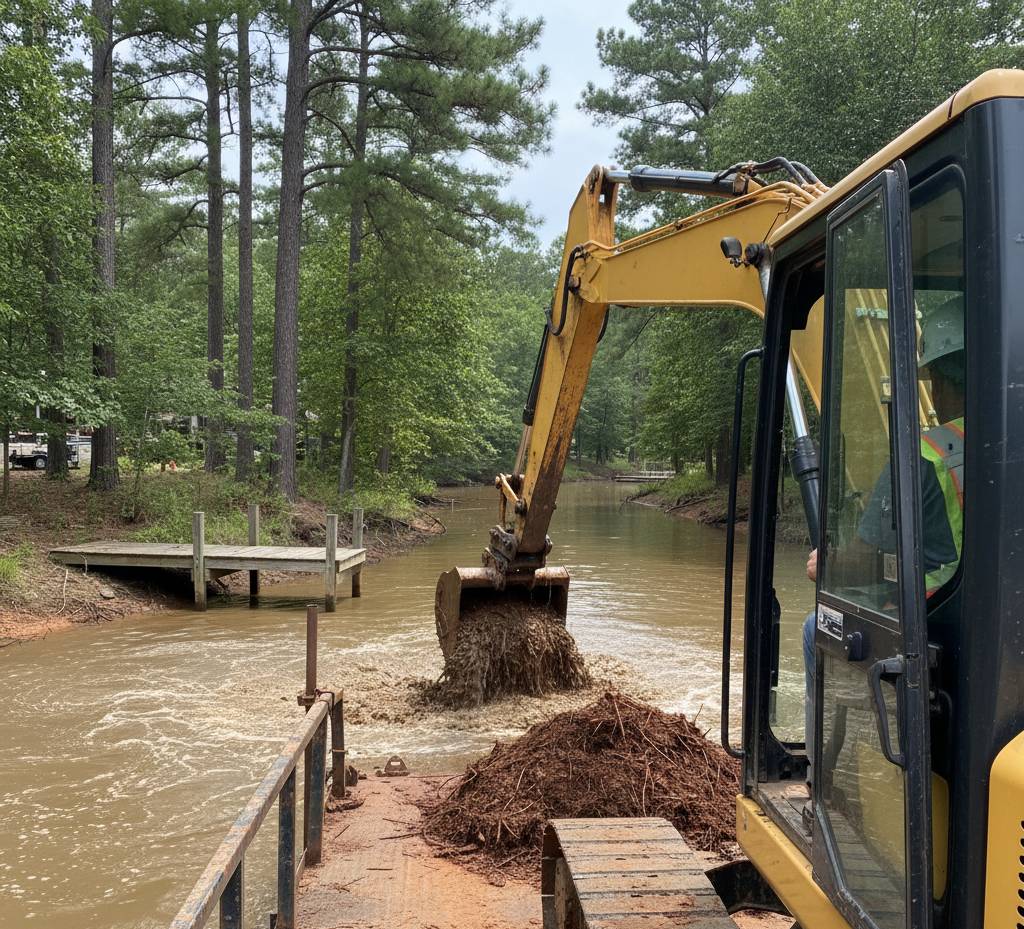
Mechanical Dredging
Ideal for tight access, shallow coves, and dock and shoreline work on lakes like Lake Murray, Lake Keowee, and Lake Greenwood. We use sectional barges for precision sediment removal in smaller HOA lakes and ponds, handling heavy red clay and dense debris.
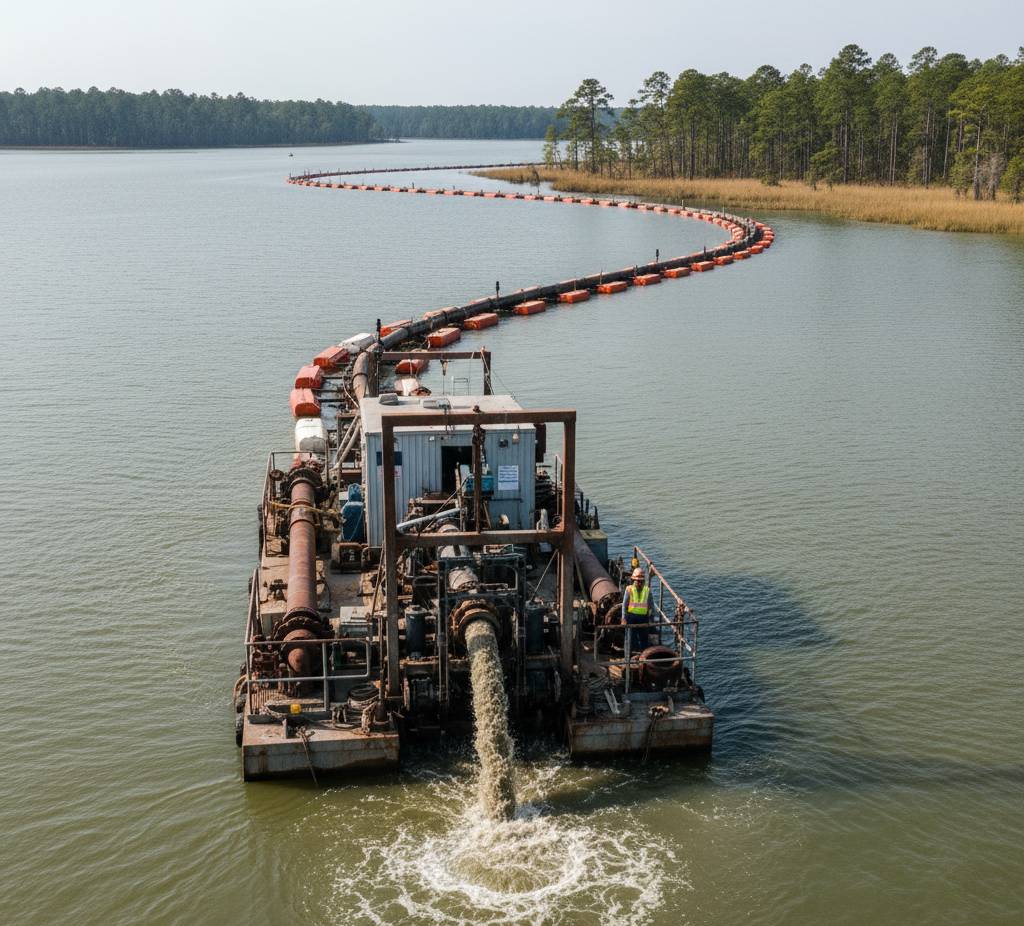
Hydraulic Sediment Removal
Best for large-scale operations on major water bodies such as Lake Marion and Lake Moultrie, and long reaches of ICW canals. We pump fine silt and muck over long distances to remote dewatering sites or tidal systems.
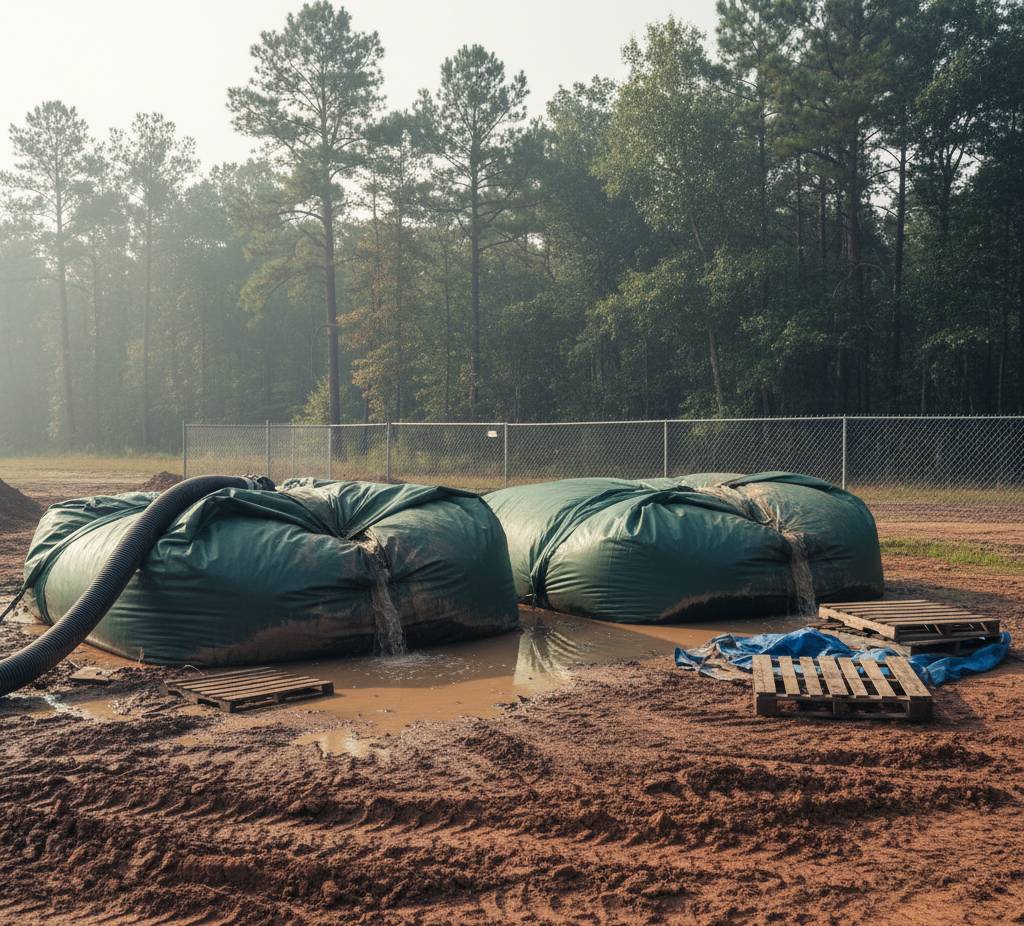
Comprehensive Sediment Management
A turnkey approach that ensures compliance with SCDHEC guidance. This includes on-site dewatering using methods suitable for diverse SC soils (sandy Lowcountry versus clay-heavy Upstate) and approved disposal or beneficial reuse planning.
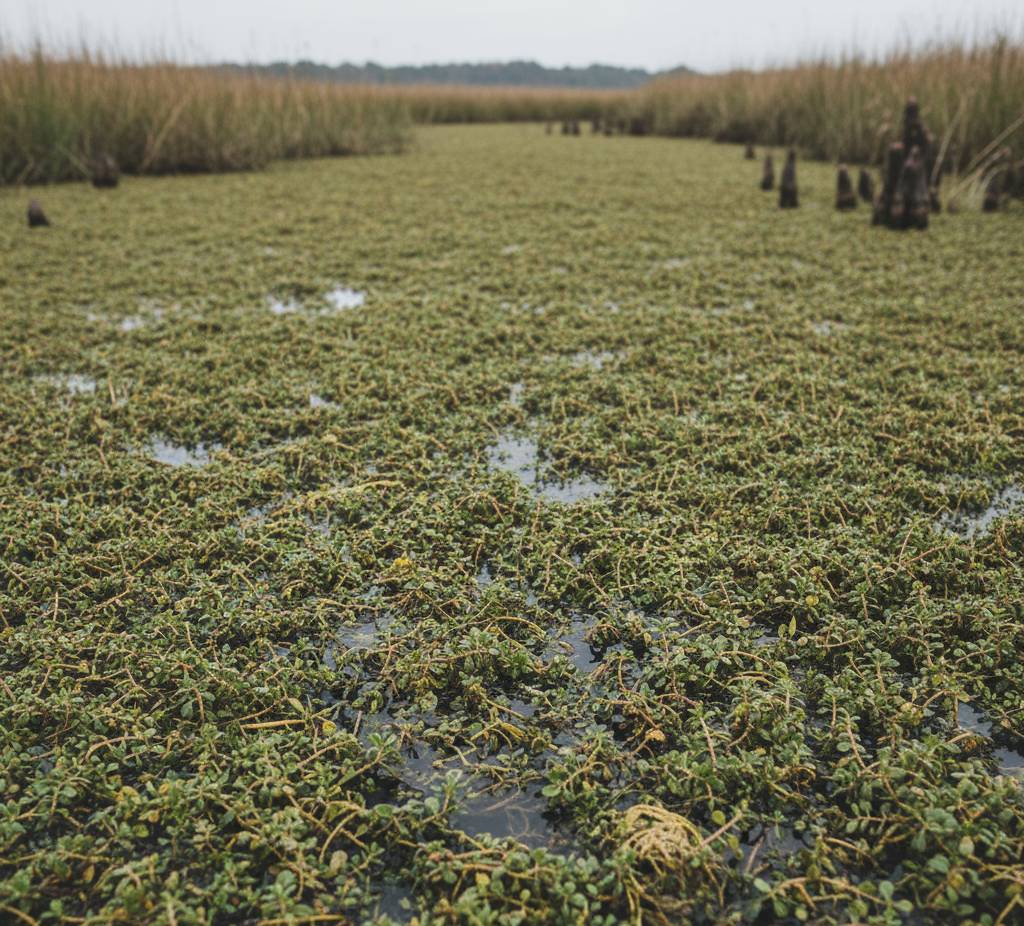
Aquatic Vegetation Management
Targeted removal of aggressive SC aquatic weeds—like hydrilla, alligator weed, and elodea—to combat the effects of shallow water and nutrient-rich sediment that cause severe algal blooms.
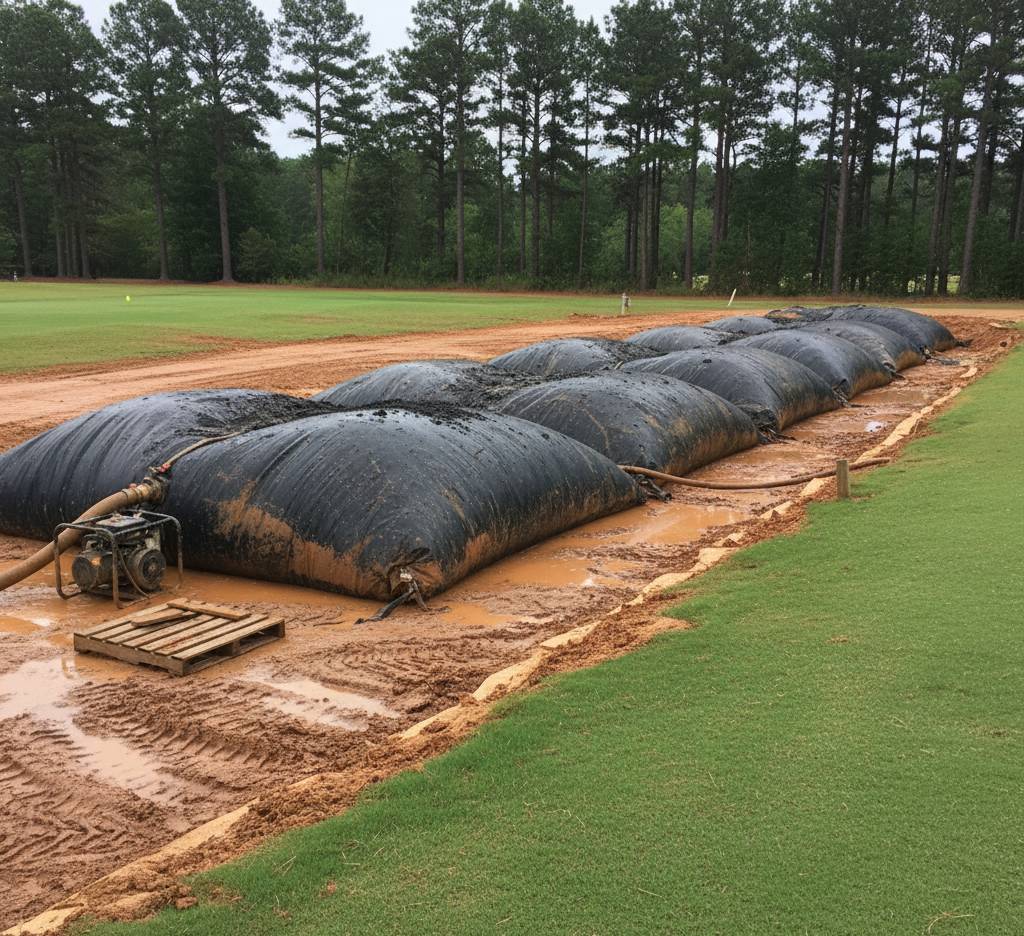
Sediment Dewatering Solutions
Installation and management of Geotextile tubes for efficient dewatering on HOAs, golf courses, and resort communities. We also design and manage upland pad drying operations where available land permits.
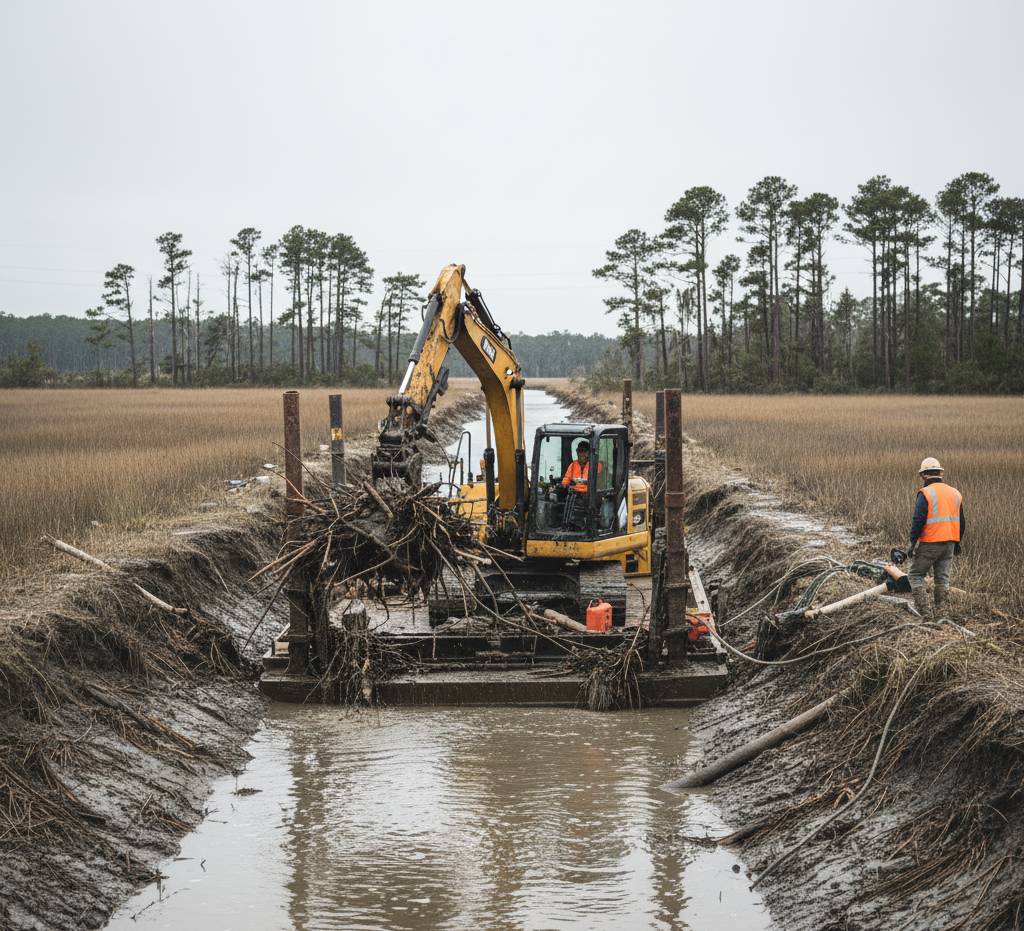
Continuous Waterway Management
Post-event cleanup and maintenance after major storms or hurricanes. We offer season-based lake management programs to prevent the re-accumulation of sediment and preserve depths after major summer lake traffic.
Protect Your Community’s Investment in Water Quality
Contact us today for a free HOA, Municipal, or Property Manager consultation. We specialize in assessing and restoring stormwater compliance and the aesthetic appeal of neighborhood lakes in the Midlands and CSRA.
Get a Detailed Quote Give Us a CallFrequently Asked Questions
Common questions about dredging in the Midlands, Lake Murray, and CSRA regions
By removing the layer of accumulated silt, sludge, and organic muck at the bottom. This reduces nutrient loading, which starves excessive algae and weeds, leading to clearer water, fewer odors, and a healthier ecosystem that is more attractive to residents in Columbia and Lexington subdivisions.
Absolutely. Stormwater retention ponds are specifically designed to hold a certain volume of water. When accumulated sediment reduces this volume, the pond’s ability to handle runoff from heavy rain is compromised, leading to potential backup and neighborhood flooding. Dredging restores the pond's intended water storage capacity.
For most Midlands HOA ponds—especially those with high stormwater runoff—dredging may be necessary every 5 to 10 years to maintain their designed capacity and aesthetic appeal. Regular professional maintenance and checkups can help extend the period between full-scale dredging projects.
Often, yes. Ponds and tributary areas near major water bodies like the Saluda, Congaree, or Savannah Rivers (especially in the CSRA around Aiken) can experience higher levels of silt and fine sediment inflow during high water events, which may require more frequent, targeted sediment removal to maintain depths and channel access.
The optimal time is typically late fall through early spring. This avoids the peak heat of the Midlands summer, which minimizes odor issues from stirred-up organic matter, and is outside of the active recreational season on popular water bodies like Lake Murray, resulting in less disruption for residents.
We prioritize low-impact dredging methods and manage the project closely. While there is inevitable noise and equipment movement, we use specialized, smaller equipment for suburban ponds and strictly control the sediment dewatering process to minimize impact on surrounding lawns, roads, and community aesthetics.
Absolutely. After proper dewatering—which can take several months—the excavated sediment can often be beneficially reused. This material is excellent for grading, creating erosion control berms, or general landscaping fill within the community, saving money on external disposal and purchasing new fill material.
For golf courses in the Columbia and Sumter areas, clean ponds maintain visual appeal for members, and more importantly, they ensure irrigation systems can draw sufficient, clean water. Removing sediment prevents clogging of pumps and piping, preserving the functionality and longevity of expensive course infrastructure.
Service Areas and Regions of South Carolina
We provide expert dredging services for private lakes, corporate ponds, and large-scale public waterways, covering the entire state from inland reservoirs to coastal marinas and tidal marsh systems.
1. Lowcountry & Coastal
The historic coastal plain defined by tidal marshes, barrier islands, and waterways like the Ashley, Cooper, and Edisto Rivers. This region features major port activity and extensive recreational waterways.
Key SC Locations:
2. Grand Strand & Coastal Pee Dee
Famous for its sandy beaches and tourism, this region is traversed by the Intracoastal Waterway (ICW) and the Waccamaw River. Its focus is on maintaining resort lagoons and battling sediment from beach sand runoff and coastal flooding.
Key SC Locations:
3. Midlands
The state's center, dominated by the Congaree, Broad, and Saluda Rivers, and home to major bodies of water like Lake Murray, Lake Marion, and Lake Moultrie. We serve the capital city and the state's largest lakes.
Key SC Locations:
4. Upstate – Greenville/Spartanburg Metro
Defined by the foothills of the Appalachian Mountains and major reservoirs like Lake Keowee, Lake Jocassee, and Lake Greenwood. Our work focuses on managing the influx of dense red clay sediment that flows into water bodies from surrounding terrain.
Key SC Locations:
5. Upstate – York County / Lake Wylie Region
The fastest-growing SC region, these suburbs are situated along the Catawba River and the Lake Wylie shoreline, sharing a distinct culture with the nearby Charlotte NC metro area. Dredging here is often for coves and erosion control.
Key SC Locations:
6. Central Savannah River Area (CSRA)
This region borders Georgia, utilizing the Savannah River system and connecting waterways. Projects often involve maintaining municipal, industrial, and private waterfronts influenced by the nearby Augusta metro area.
Key SC Locations:
Inquire for special projects outside these core SC areas, including nearby GA and NC border communities.